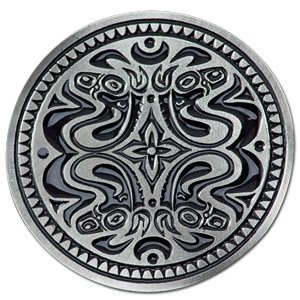Not a great picture... but hey, it was a great dinner. Ossabaw pork tenderloin, cooked to a rosy medium from Nature's Harmony Farm.
I'll preface this post by saying that though backed by a few factual bits, most of this post is editorial.
Most people have had a pork chop. Unfortunately many of those same people have had bad pork chops. It's not the pigs fault really, or even the cook's fault to some extent, it is the sCaRy trichina worm. Trichinella spiralis to be specific. I along with millions of other home cooks, were raised with the thought that you had to cook pork thoroughly to kill this parasite. It just isn't true. Fortunately for those of you reading this, you can rest assured that I will help dispel this myth and help you cook a better pork chop.
Let me back-track a bit. Trichinosis was at one time a more significant concern than it is today. In decades of yore (let's say my grandparent's generation), the pigs that were raised for human consumption in factory farms were fed garbage. Food scraps, waste from restaurants, waste from food processing plants, and other tasty bits. Of course because they were pigs they didn't much care: if it was tasty, well then that was just fine. Trichinosis infection in people was somewhat common. According to my trusty interwebs netpages research, approximately 1 in 6 people were infected in the 30's and 40's. Today the pigs are still fed food scraps, but those scraps are cooked. Let's call it gourmet garbage, because cooked rotting beef parts and banana peel just sounds so much more appetizing. Partly as a result of this cooking, there has been a significant drop of trichina worms in pigs raised for consumption during my parent's generation. We'll call this the 50's and 60's. This paragraph is where I should include a reference or two but hey, it's a blog not a research paper... Just trust me.
Old habits die hard. You can't expect people to change their cooking habits overnight, things like this take time. How 'bout we give people 60 years to rid themselves of the nasty habit of mercilessly overcooking pork? Done... and here we are today. Today we live in a world where pork raised in the US is virtually free of the trichina worm. Even if the parasite was present in pork, the US Department of Agriculture says that it is killed in under one minute at a temperature of 140 degrees F. At 140 degrees F commercial pork is often rosy pink and still relatively juicy depending on the cut, but in my experience there is a narrow window where this pork is done perfectly. Because of the lack of fat in commercial pork, going too far above 140 F and you can end up with that dreaded, dry hockey puck.
So now we have a new problem. While we were eliminating the parasites found in pork, we were also breeding the fat (and thus flavor) out of the meat. The perception was that leaner is better. The National Pork Board is proud of this fact. They often compare it to lean poultry when in actuality pork shouldn't be all that white or lean to the point where it has virtually no intramuscular fat. Real pork - pork with flavor - is varying shades of dark pink or red.
For a long time, pork fat was the enemy. The rain on our pork parade. While we shouldn't gorge ourselves on pure pig fat (please kindly disregard my previous posts on Lardo di Arnard), there is a silver lining to that porky rain cloud. The fat in some pork, especially pastured or true, free range pork, rivals the levels of heart healthy oleic acid found in olive oil. Doesn't sound too bad does it? What if you heard that pork fat was lower in saturated fat than butter? It is. The pastured pigs found at an ever increasing number of farms dine on natural forage. Nuts, acorns, tubers, bugs, etc. This natural forage and the ability to roam freely (within reason of course) on wooded pasture is what lets pigs be happy and healthy. A happy and healthy pig produces happy and healthy meats for the consumer.
Now where can you, the "average consumer" find this pastured pork? You could take the time to drive out to a farm, talk to the folks who raised it, see the environment in which it was raised, ask a few questions, and eventually buy some pork and trek back home. Seriously, I would recommend it - but in reality not everyone has the time or the desire to do such things. We want convenience. So what if that same farmer instead came to your town and delivered that pork to you? Would that be convenient enough? You're in luck. How about you check out the new Farm Train from Nature's Harmony Farm. It is an easy way to buy direct from the farm on a fairly regular basis. Just go to the link above or visit Nature's Harmony website and enter your email address in the bottom right corner. They will notify you of upcoming deliveries and send you an email when it's time to buy.
Go getcha some.
Oh they have chicken (and eggs), beef, cheese, lamb, rabbit, heritage breed turkeys and other meats too but perhaps those belong in a different post.


